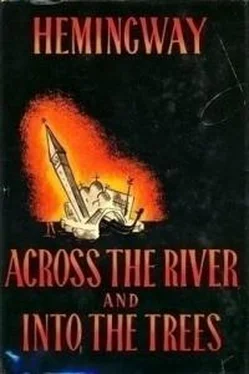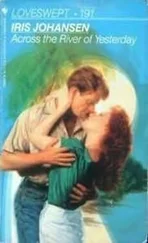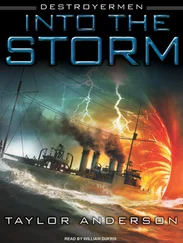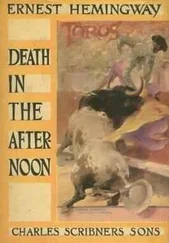'I know,' the Colonel said. 'You can stay in the sack until noon if you want.'
'I brought my repellent. I ought to sleep O.K.'
'I'm not sure you'll need it,' the Colonel said. 'Did you bring any K–rations or Ten in One? They're liable to eat Italian food, you know.'
'I brought a few cans to help out and a little stuff to give away.'
'That's good,' the Colonel said.
He was looking ahead now to see where the canal road joined the main highway again. There he knew that he would see it on a clear day such as this was. Across the marshes, brown as those at the mouths of the Mississippi around Pilot Town are in winter, and with their reeds bent by the heavy north wind, he saw the squared tower of the church at Torcello and the high campanile of Burano beyond it. The sea was a slate blue and he could see the sails of twelve sailing barges running with the wind for Venice.
I'll have to wait until we cross the Dese River above Noghera to see it perfectly, he thought. It is strange to remember how we fought back there along the canal that winter to defend it and we never saw it. Then one time, I was back as far as Noghera and it was clear and cold like to–day, and I saw it across the water. But I never got into it. It is my city, though, because I fought for it when I was a boy, and now that I am half a hundred years old, they know I fought for it and am a part owner and they treat me well.
Do you think that's why they treat you well, he asked himself.
Maybe, he thought. Maybe they treat me well because I'm a chicken colonel on the winning side. I don't believe it, though. I hope not, anyway. It is not France, he thought.
There you fight your way into a city that you love and are very careful about breaking anything and then, if you have good sense, you are careful not to go back because you will meet some military characters who will resent your having fought your way in. Vive la France et les pommes de terre frites. Liberté, Venalité, et Stupidité . The great clarte of the French military thinking. They haven't had a military thinker since du Picq. He was a poor bloody Colonel, too. Mangin , Maginot and Gamelin . Take your choice, Gentlemen. Three schools of thought. One; I hit them on the nose. Two; I hide behind this thing which does not cover my left flank. Three; I hide my head in the sand like an ostrich, confident in the greatness of France as a military power and then take off.
Take off is putting it very cleanly and pleasantly. Sure, he thought, whenever you over–simplify you become unjust. Remember all the fine ones in the Resistance, remember Foch both fought and organized and remember how fine the people were. Remember your good friends and remember your deads. Remember plenty things and your best friends again and the finest people that you know. Don't be a bitter nor a stupid. And what has that to do with soldiering as a trade? Cut it out, he told himself. You're on a trip to have fun.
'Jackson,' he said, 'are you happy?'
'Yes, sir.'
'Good. Shortly, we are coming to a view that I want you to see. You only have to take one look at it. The entire operation will be practically painless.'
I wonder what he's riding me for now, the driver thought. Just because he was a B.G. once he knows everything. If he was any good as a B.G. why didn't he hold it? He's been beat up so much he's slug–nutty.
'There's the view, Jackson,' the Colonel said. 'Stop her by the side of the road and we'll take a look.'
The Colonel and the driver walked over to the Venice side of the road and looked across the lagoon that was whipped by the strong, cold wind from the mountains that sharpened all the outlines of buildings so that they were geometrically clear.
'That's Torcello directly opposite us,' the Colonel pointed. 'That where the people lived that were driven off the mainland by the Visigoths. They built that church you see there with the square tower. There were thirty thousand people lived there once and they built that church to honour their Lord and to worship him. Then, after they built it, the mouth of the Sile River silted up or a big flood changed it, and all that land we came through just now got flooded and started to breed mosquitoes and malaria hit them. They all started to die, so the elders got together and decided they should pull out to a healthy place that would be defensible with boats, and where the Visigoths and the Lombards and the other bandits couldn't get at them, because these bandits had no sea–power. The Torcello boys were all great boatmen. So they took the stones of all their houses in barges, like that one we just saw, and they built Venice.'
He stopped. 'Am I boring you, Jackson?'
'No, sir. I had no idea who pioneered Venice.'
'It was the boys from Torcello. They were very tough and they had very good taste in building. They came from a little place up the coast called Caorle. But they drew on all the people from the towns and the farms behind when the Visigoths overran them. It was a Torcello boy who was running arms into Alexandria, who located the body of St. Mark and smuggled it out under a load of fresh pork so the infidel customs guards wouldn't check him. This boy brought the remains of St. Mark to Venice, and he's their patron saint and they have a cathedral there to him. But by that time, they were trading so far to the east that the architecture is pretty Byzantine for my taste. They never built any better than at the start there in Torcello. That's Torcello there.'
It was, indeed.
'St Mark's square is where the pigeons are and where they have that big cathedral that looks sort of like a moving picture palace, isn't it?'
'Right, Jackson. You're on the ball. If that's the way you look at it. Now you look beyond Torcello you will see the lovely campanile on Burano that has damn near as much list on it as the leaning tower of Pisa. That Burano is a very over–populated little island where the women make wonderful lace, and the men make bambinis and work day–times in the glass factories in that next island you see on beyond with the other campanile, which is Murano. They make wonderful glass day–times for the rich of all the world, and then they come home on the little vaporetto and make bambinis. Not everyone passes every night with his wife though. They hunt ducks nights too, with big punt guns, out along the edge of the marshes on this lagoon you're looking across now. All night long on a moonlight night you hear the shots.' He paused.
'Now when you look past Murano you see Venice. That's my town. There's plenty more I could show you, but I think we probably ought to roll now. But take one good look at it. This is where you can see how it all happened. But nobody ever looks at it from here.'
'It's a beautiful view. Thank you, sir.'
'O.K.,' the Colonel said. 'Let's roll.'
But he continued to look and it was all as wonderful to him and it moved him as it had when he was eighteen years old and had seen it first, understanding nothing of it and only knowing that it was beautiful. The winter had come very cold that year and all the mountains were white beyond the plain. It was necessary for the Austrians to try to break through at the angle where the Sile River and the old bed of the Piave were the only lines of defence.
If you had the old bed of the Piave then you had the Sile to fall back on if the first line did not hold. Beyond the Sile there was nothing but bare–assed plain and a good road network into the Veneto plain and the plains of Lombardy, and the Austrians attacked again and again and again late through the winter, to try to get on to this fine road that they were rolling on now which led straight to Venice. That winter the Colonel, who was a lieutenant then, and in a foreign army, which had always made him slightly suspect afterwards in his own army, and had done his career no good, had a sore throat all winter. This sore throat was from being in the water so much. You could not get dry and it was better to get wet quickly and stay wet.
Читать дальше
Конец ознакомительного отрывка
Купить книгу












